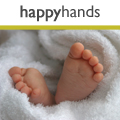Baby Clinic
Development
Taking care of your baby's teeth
When your baby cuts his first teeth, they are pearly white and unblemished. But even breastmilk has a high sugar content and it's a good idea to get into the rhythym of good dental care right from the start.
When should I begin brushing?
It is never too early to begin brushing and start to familiarise your child with a dental routine. Even before the first tooth comes through, you should clean your child's gums with a clean damp cloth or a special finger toothbrush. At this early stage toothpaste is not necessary.
Presumably I don't need to worry while my baby's breast-feeding?
Once your baby has teeth, breast milk can cause decay. Often parents are very health-conscious and avoid sugary drinks, but don't realise that breast milk is very sweet. Wipe inside and around baby's mouth with a clean cloth after breast-feeding to remove milky residue.
When should I start using toothpaste?
Once the first tooth appears, use a smear of children's toothpaste (adult toothpaste may have too much fluoride). When there are more teeth, use a pea-sized amount. Get your child to spit out but don't rinse too thoroughly as the fluoride goes on protecting teeth (but don't let your child swallow the toothpaste - too much fluoride!).
I don't need to worry too much while my child still has only milk teeth, do I?
Yes you do! It's not just a matter of establishing good habits or avoiding the pain and distress of fillings; decay in baby teeth can affect the development of adult teeth and create ongoing decay. Baby teeth also affect the way your child's jaw grows; they provide space for the adult teeth to grow and guide them into place. Missing teeth can cause misalignment of adult teeth. Early oral hygiene is also important for your child's overall health; some diseases in adulthood have been linked to tooth decay.
How often should I brush my child's teeth?
For two minutes twice a day, after breakfast and before bed.
What sort of brush is best?
Use a soft-bristle toothbrush with a small head. Don't share brushes and change them every three months. Change the brush after a cold or illness. Brush-Baby is a clever alternative for babies and toddlers up to 4yrs - chewing on this flexible teether-brush cleans teeth and gums and can also soothe when teething.
What is the best method for brushing?
Place the toothbrush alongside the teeth with the bristles at a 45 degree angle to the gum line and gently move the brush in a small circular motion cleaning one tooth at time. Brush the back and top of the teeth as well as the front. And don't forget the tongue - light brushing will remove bacteria and keep breath fresh.
When should my child start flossing?
As soon as you can introduce it. Tooth decay usually comes from between the teeth, so flossing is really important. Find whatever way is most comfortable for your child and make it part of their night-time routine.
When is my child old enough to brush and floss alone?
You'll need to do it for them up to 4-6 yrs, but continue to supervise until your child is at least 8 yrs to ensure they are brushing and flossing correctly and for long enough.
How can I prevent decay?
Avoid snacking! The main cause of tooth decay is not the amount of sugar or acid in the diet, but the frequency of intake. The more time these harmful substances spend in the mouth, the more likely children are to have decay. Water is the best drink between meals; keep any sugary treats for mealtimes only.
Try to teach your child to drink from a cup as soon as possible, as this is less likely to cause the liquid to collect around the teeth. The bacteria that causes tooth decay can be passed from adults to babies, particularly aged 6-31 months. Avoid sharing utensils, and never pick up a dropped dummy and 'clean' it in your own mouth.
Is sucking a thumb or dummy a problem?
Sucking on anything introduces bacteria into the mouth. Try not to let babies become dependent on anything in their mouths, and use bottles only at feeding time, not as a pacifier.
How can I overcome the bathroom battles?
Use positive enforcement and a routine. Offer gentle but persistent reminders that oral hygiene is not negotiable. Over time your child will associate the daily routine with the sensation of clean teeth. Research has shown that if you start methodical and consistent tooth brushing from early on, you will face fewer problems during your child's pre-teen and adolescent years.
Brushing aids also help motivate your child as they help reduce dental fear and influence good behaviour patterns. Flipper, a fun brush and bristle guard for your child's toothbrush, is a great example. The DIY Brush-Baby (see above) can avoid such battles altogether.
When should we first visit a dentist?
The NHS don't want to see you until children are starting school, but that's often too late. 50% of five year olds have tooth decay, and the biggest reason for general anaesthetic in children is tooth extraction. You should see a dentist as soon as first teeth come through. Regular check-ups and good oral hygiene from an early age will mean that dental visits are a pleasurable experience.
Related Articles
A Great Day Out at The Baby Show, Excel
Preparing Premature Infants for School
BornFree – the natural approach to bottles
Bottle-feeding: keeping it natural
BabyBjörn venture into drinking cups
Buyer's guide to nappy rash treatments
ReadingZone: best new books published in October
Related Products
Bonnie Baby, Luxury baby knitwear
Mamas and Papas, Mamas & Papas Prima Pappa
Related Forum Topics
Forums: Baby
Re: Try this perfect family lunch in Hyde Park
Clare, Mother of 2, London
Re: My daugher's got croup - 8mths
Amelie, Mother of 1
Re: Second hand/ nearly new baby shops??
Clare, Mother of 2, London
Reproaching a stranger for bad behaviour to their child.
Patricia6
Re: does any1 know anything that will help me get my baby into a better sleep routen?
clarejayne, Mother of 1, Nottinghamshire
Have Your Say
Be the first person to comment on this article, just post a comment below.






In order to post a comment you need to be a member. Join Now | Sign in